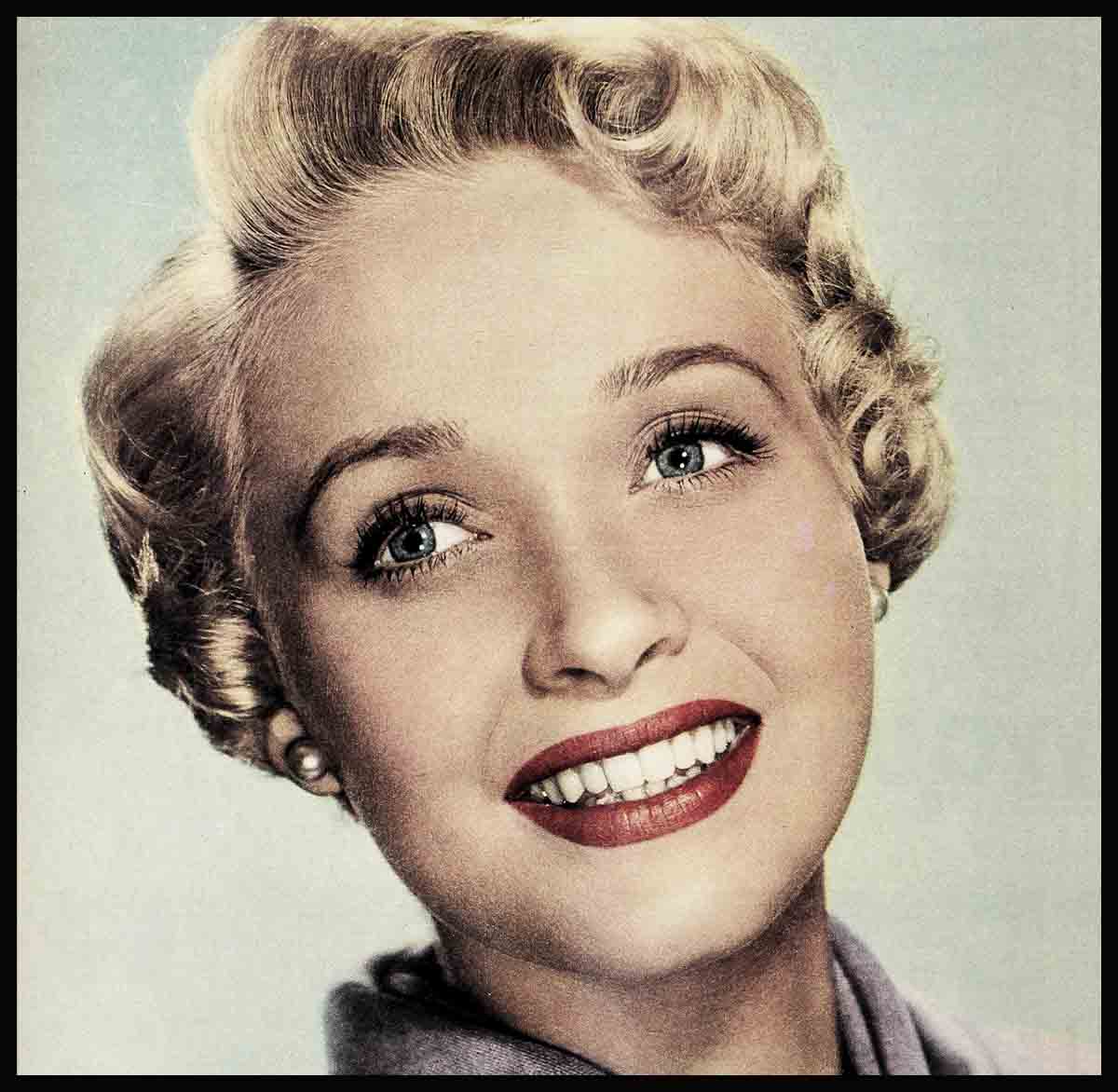
The Truth About Jane Powell’s Marriage
Of all the nice things about Jane Powell, one of the nicest was always the fact that you could count on her. She was predictable. Janie could be depended upon as a solid family girl. And in a town where families fall apart almost as often as hair styles change, that kind of dependability was comforting.
So you can understand Hollywood’s confusion when Janie suddenly changed her behavior pattern.
The trouble is, Jane wants to have her marriage cake and eat it too. She has found plain bread and butter is a little dull, so now she wants to sow some wild oats. Forgive the mixed metaphors, but I’m just as confused as you must have been when little Janie announced to the world, through her studio spokesman, that she was tiffing with her husband, Geary Steffen, and that she wasn’t sure whether or not their marriage would survive the spats.
And if you think we observers were bewildered, it was nothing compared to the confusion of the principals in the case. They were parrying, on the one hand, a calm, steady home and family against exciting romance and off-beat adulation on the other.
If you include Gene and Miriam Nelson, you might say that there were four principals involved—or seven, if the three little innocent bystanders are counted. And the entire mix-up—from beginning to end—was highlighted by a series of contradictory statements.
“Geary will be too busy with his work to stay with me when I go to Las Vegas for PA appearances,” Jane told me when the story first made headlines.
“I’ll be in Las Vegas with Janie and the children,” stated Geary when I first called him to check the startling separation story.
“We’re separated,” said Janie—then added, not too hastily, “while I’m on tour, of course.”
“What chance does your marriage have?” I persisted.
A slight pause, then, a shade too brightly: “I’d say a sixty-forty chance. We hope to be able to work it out.”
Then back in Hollywood, from Geary: “No, I won’t be going to Vegas.” And a nurse would be taking the two children to be with their mother for a month. “But,” Geary added, “she will stay in the house for a couple of days before going to Nevada.” In answer to my question: “Sure, I’ll be there, too.
“I talked to Janie in Toronto,” he went on, “and she had a very successful show. But she’ll stay in New York longer than she expected.”
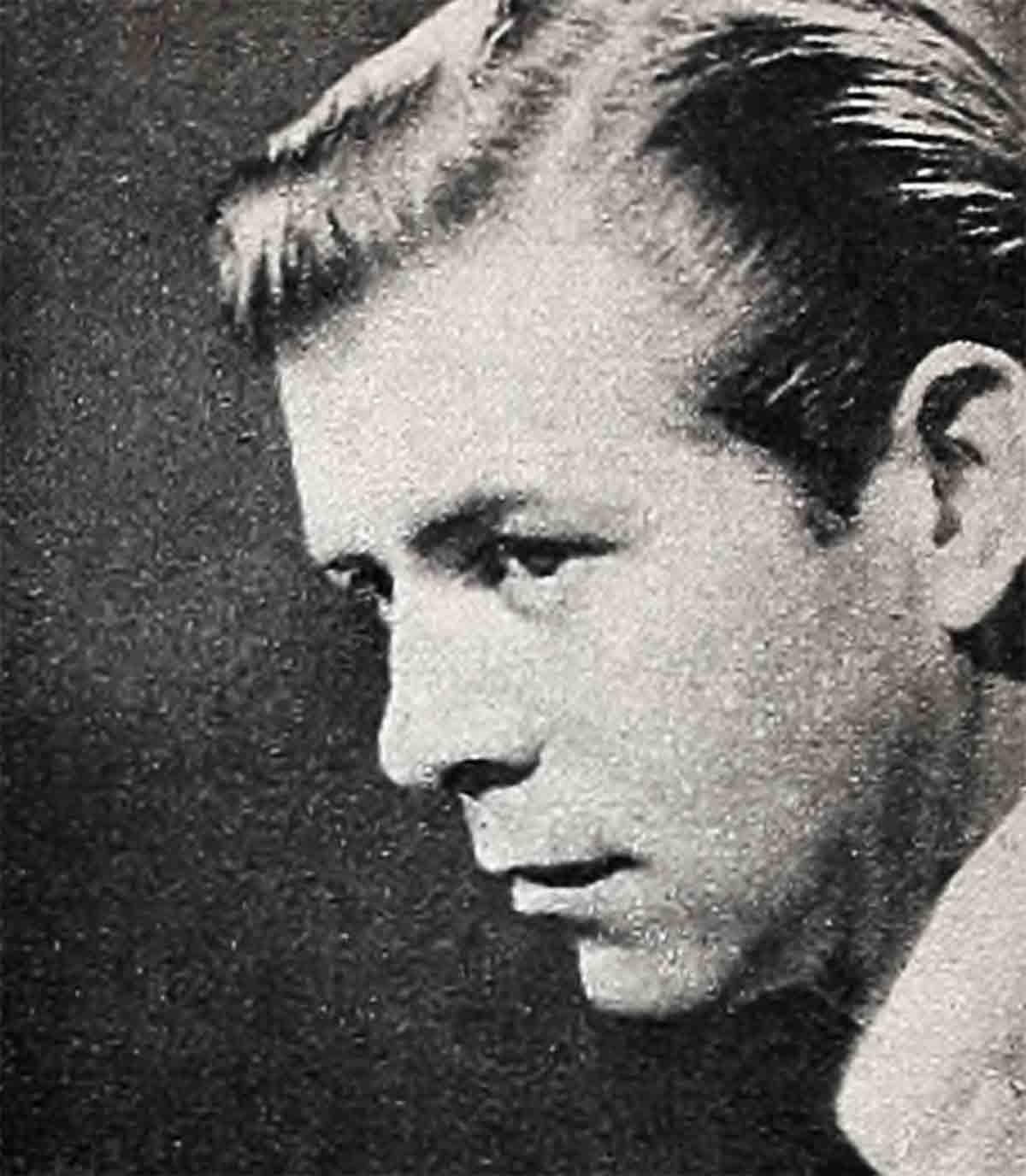
By the oddest coincidence (or was it a coincidence?), Gene Nelson, the man the Steffens had reportedly quarreled over, was in New York at the same time. While Jane was there, she refused to say anything to the press about her marital situation or about Gene. As for Gene, he did talk, brushing off the suggestion that the two might be involved in a romance. “After all, I’ve known the Steffens for years. I knew Geary long before I knew Janie. Just because we made a movie and were working very close together, people come along with all these rumors. I don’t even read the papers any more. Why don’t they just leave me alone?”
But Gene slipped in a contradictory statement of his own, providing (intentionally or unintentionally) an easy out. “If they keep it up,” he said, “they’ll drive Janie and me together. If that’s what everybody’s saying anyhow, we might as well . . .”
Yet out in Hollywood Geary was insisting, “I absolutely think our marriage has a good chance. Of course, I’m the optimistic type, while Janie has always been a conservative.”
And then, like Gene, he turned bitter: “If any other man and wife have a spat, nobody knows it. We quarrel, and the whole world screams. I’m more in love with Jane than ever.”
But the big question is: Is Jane more in love with Geary than ever? Any real answer to that question must wait. But if she is, she has not been showing it. Though Geary and the children did accompany her to Las Vegas for her personal engagement there, Geary did not stay long. Shortly after he left, Gene Nelson arrived—on a holiday. He and Jane made no secret of the fact that they were seeing each other regularly.
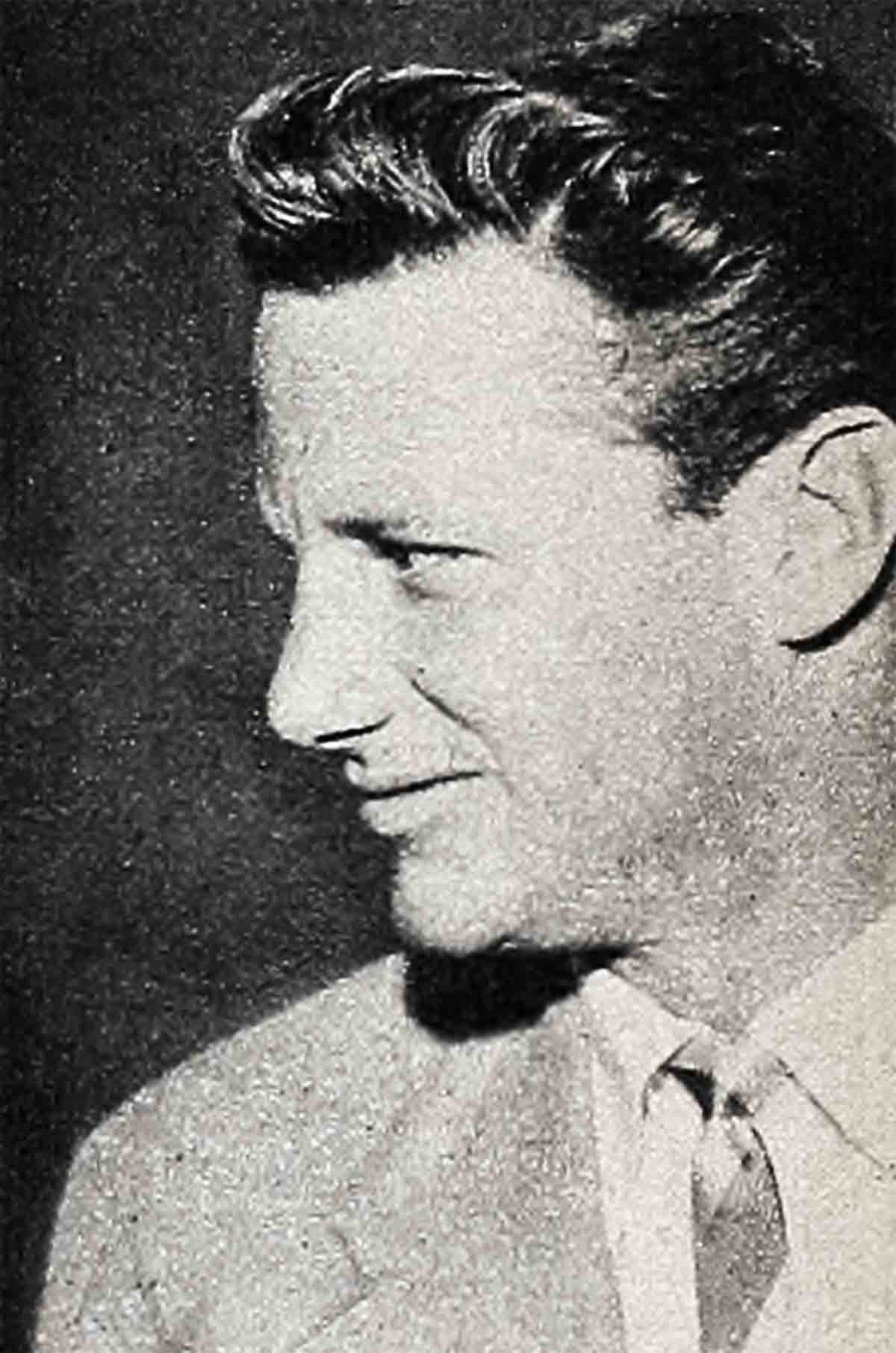
And Geary? During this period Jane said, “I have the greatest sympathy for him. But I want to be happy.”
Proust, the French author, wrote that the tragedy of all love lies in the fact that one is always more in love than the other. If the woman is more in love than the man, he gets bored. And the opposite is equally true. On face of it, and by their own admissions, Geary has always been more in love with Jane than she with him.
Jane is quiet; we used to think of her as almost the mousy type; she hates anything on the sensational side. When producer Joe Pasternak made her dye her mouse-colored hair for a picture, she was terribly unhappy, and wanted to re-dye to the natural color as soon as the picture was over. And she did, though the blonde locks went much better with her blue eyes, especially on the screen. In spite of her outward docility, Jane has shown tenacity and determination to succeed from the time she was a teenager.
She was always so sensible. Janie dated very few boys before Geary. And when she fell in love with him, she was in no rush to marry, unlike Elizabeth Taylor, who has always had to translate a desire into an accomplished fact right off the bat.
“I make more money than Geary,” Jane told me so sensibly at the time. “So we’ll wait until he can pay his way. That’s how he wants it.” And that’s the way it was. They rented a small house at the beginning, and Geary paid the rent. I believe Janie paid for some of the food, but that was all. She was able to save most of her four-figure-a-week salary.
Geary had been an ice skater when he met the pretty movie star of his dreams. (Gene Nelson’s also a graduate of the ice shows.) With marriage ahead, Geary got down to basic facts and landed a job with a big insurance company. Like any other adoring wife, Jane drummed up business for her husband, but he didn’t need her help; he’s a worker. Then came the babies, and Jane looked like a little dream on a cloud, always chic, at every party with her husband, proud of her approaching motherhood.
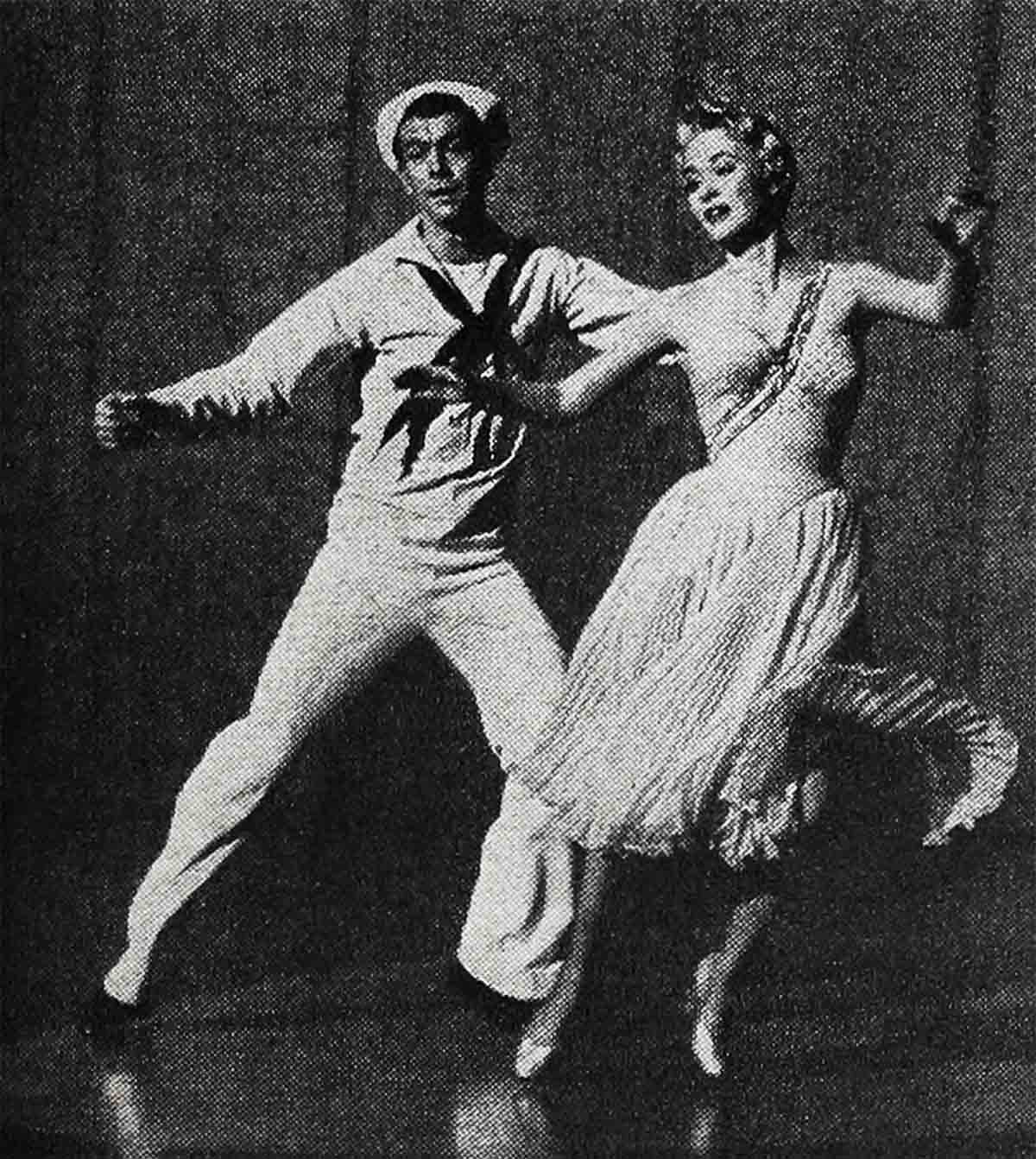
And her career flourished in spite of the quiet domesticity that some people might have called humdrum. They say in Hollywood that any publicity, no matter how sensational, is good for your career. It certainly has worked for Marilyn Monroe, Lana Turner, Errol Flynn and Ava Gardner, to mention a few who increased in star stature because of (or in spite of) lurid press coverage. But Janie didn’t seem to need it. And her marriage was a great thing for this town. When headline seekers made Hollywood a synonym for Sin, we could point pridefully to Jane and Geary, as normal as Nantucket, as peaceful as Podunk, as happy as hallelujah.
What happened? When did the maggot get into the woodpile? (Ugly words for an ugly surprise.) Exactly two days before the Metro announcement, Jane and Geary were celebrating her twenty-fourth birthday at Ciro’s—seemingly happy. But a tip-off should have been seen in the presence of Gene Nelson, who had recently separated from his wife Miriam.
Though Gene wouldn’t give any reason for the break-up in his own household, he insisted that it had nothing to do with Janie. “The trouble started about a year ago,” he said, “after a trip to New York. And for a whole year we did our best, but it just didn’t figure. Miriam’s a wonderful girl; she deserves the best of everything. Maybe I can’t provide it.”
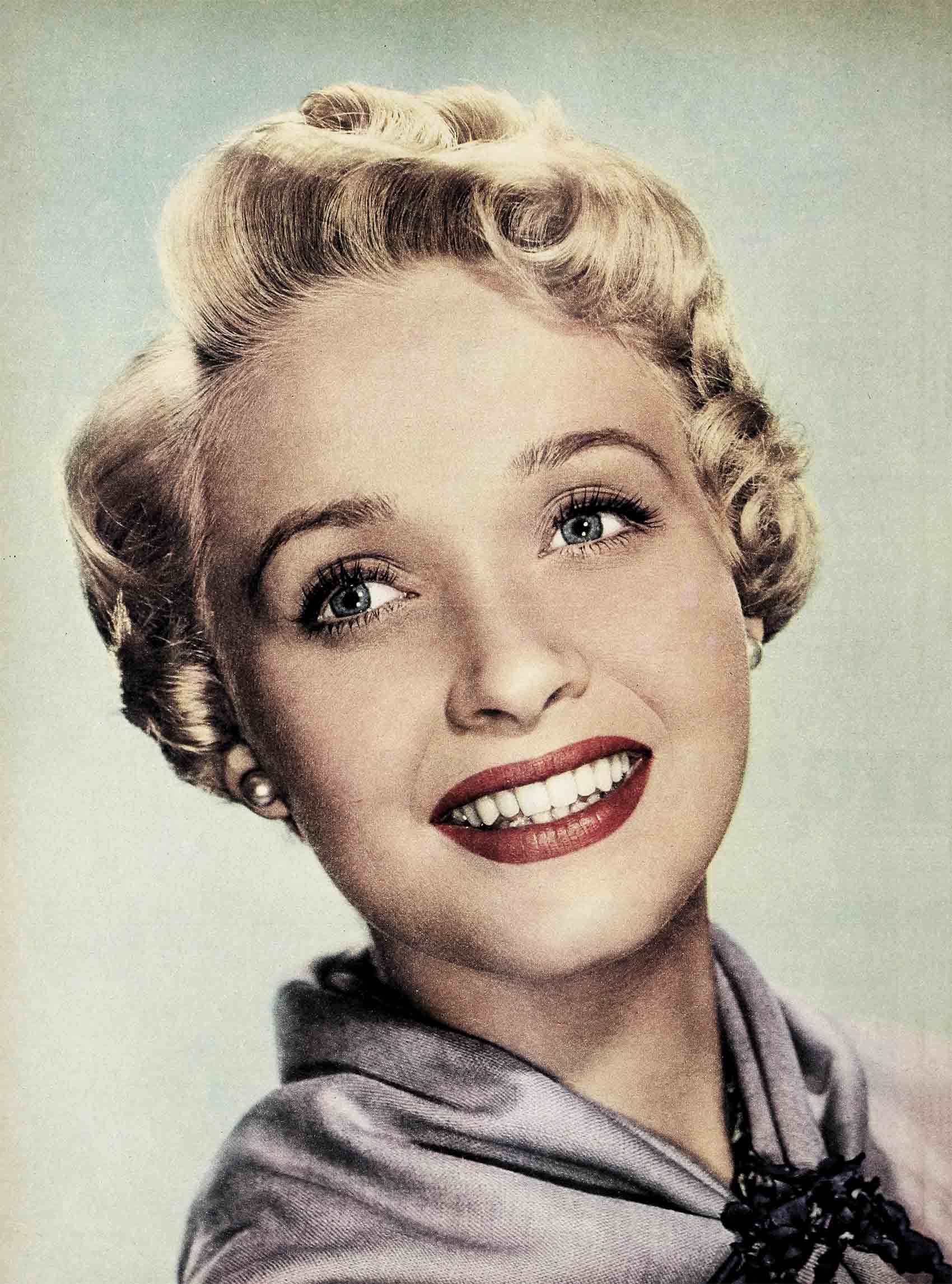
Except for Gene’s own statement, to date there have been no denials of the stories concerning his role in the Steffen crisis. But no one can hurt a marriage if it’s a happy one. So the trouble must have started before Jane went to Warners to make “Three Sailor and a Girl.” Jane was the girl; Gene was a sailor; and he was acting like a sailor who is really home from the sea.
I kept hearing reports that Jane was falling in love with the blond, good-looking dancer. But she was happily married, wasn’t she? So I told off the people who told me. Later, I heard that Miriam had stormed onto the set to have a few strong words with Janie. Then came the news that Janie had fainted a couple of times while making the picture, and a fantastic story that Geary had socked Gene during a heated argument. But I still wouldn’t believe there was anything wrong with her marriage. I wouldn’t have believed there was trouble if I’d seen it with my own eyes and heard it with my own ears. And I still didn’t go for it, even when Metro confirmed the rumors.
For the record, Gene later said that he, too, was surprised at the announcement. “While we were making the picture, I wasn’t aware that Jane had any marriage problem. You don’t discuss that sort of thing over lunch. It’s very regrettable, but I think the Steffens have a chance to patch it up. Their difficulties aren’t as serious as ours.” As for the fact that the Steffens’ separation came so soon after the Nelsons’, Gene dismissed this as “an amazing coincidence,” adding resentfully, “And people jumped on it in great style!”
However, when Janie herself talked to me and admitted there had been great difficulty, without saying why or what, I decided to find out Why and What.
Now I’m not a psychiatrist, but I’ve been around in Hollywood a long time, and that practically makes you one. This is the way I see it. Before she married Geary, Jane was very close to her mother—because she wanted to be, and because the studio preferred it that way. I remember how unhappy she was, and how reticent, when her mother and father separated. Before she was married she bought them a beautiful house in the valley, complete with pool. Every weekend all the starlets and their beaux gathered there.
You never saw Jane in a night club. She never knew how the other half lived or loved, never even took a peep through the wall. But she was curious, like all normal girls. She was always very controlled and serious, but I should have guessed that still waters were running a little deep when she begged Joe Pasternak to put her in a picture where for once she wouldn’t be the sweet young thing. Joe just laughed and pointed to the way Deanna Durbin’s career declined when she began playing women of the world. According to Joe, she should have remained wide-eyed and wondering on the screen until her middle twenties at least. When he finally allowed Jane to be kissed on the screen, what a fuss! It was a scene with an adolescent boy, although Jane would have preferred to rub noses with a sophisticated movie Romeo.
Okay, so she marries and she’s no longer a baby and she can have romance in her movies. Most young actresses in Hollywood marry early to escape family dictatorship, but not Jane. She loved her parents and she loved Geary.
On the early personal-appearance tours, Geary used to go with her. But in the past two years he hasn’t been able to leave his work. He’s been doing too well. Besides, someone had to stay home with the baby and keep the home fires burning. So there was Jane, a famous star, an attractive girl, on her own for the first time in her life. And it was fun to be admired, nice to hear she was beautiful and had a great singing voice. Now she was seeing how the other half carried on. It was exciting. And it seemed a little bit of a letdown to be the same old dependable Janie when she returned to Geary’s loving arms in Hollywood.
She’d always been thrifty, never given parties, even made some of her own dresses. But now she wanted beautiful clothes, furs, and a new, grander house. It was ironic that Geary moved her into the new, big mansion when their marriage was at its shakiest. They were happier a year and a half ago when they bought the smaller home. But along came another baby—and another outlook.
The second child very often changes a woman. (We sometimes forget that a movie star is also a woman.) After having two babies so close together, you yearn very intensely to be slim, chic and admired again. It happened to me, and I’ve heard it from a lot of other women. So Jane wanted her fling.
But maybe she’ll learn that in the long (or short) run, a good home and an adoring husband mean more than the excitement of a quick romance—especially in Hollywood, where you must have something peaceful to come home to after the spotlight has tensed you to the screaming point.
Perhaps that’s the trouble. Jane never screams. She’s always quite controlled, and it’s hard for me to visualize her in a yelling session with Geary. Though Geary’s the easygoing type, he gives the impression that he could fight like a lion for what he really wants. And he wants his wife.
He took her to the plane for the trip East, when everyone was linking Jane with Gene Nelson in their columns. Another man would have been embarrassed, but Geary smiled through the stares. And Jane went with him to the airport when the midget British car he is agenting arrived by plane. She posed for pictures there, and gave Geary his first order. He called her every day in New York—without asking whether she was dating Mr. Nelson. It couldn’t really be easy for Jane to untie the knot, and she would have had to be really bored with her boyish husband to divorce him. He not only loves her, but he’s crazy about the kids. And a poor boy who has the guts to marry a movie star has the energy to hang on to her.
Besides, property-wise it would be very difficult indeed to break up the marriage. In his quiet, efficient way, Geary has done pretty well financially; for every two dollars Jane has invested, he’s put up one of his. Together they own two apartment houses, and they’re in the middle of building a third. Of course, the laws of California give Geary fifty per cent of Jane’s big income. (She’s reached the high brackets since her marriage.) And the business of dividing this sum would be very headache-making.
But more important than money or property, there are the children. For an idea of the heartbreak that would be involved in deciding the question of custody, Janie might consider Gene Nelson’s patently unhappy words, while the future of little Chris was still in doubt: “At first, I thought of making it fifty-fifty, but I don’t want to split up the kid’s life. That way, he’d be yanked up every six months and have to get used to new friends, a new school, new teachers, a new family. I’d like to take him right now, only it wouldn’t be fair to him. But I want complete visiting privileges!”
It isn’t pleasant to picture Jay and Suzanne Steffen at the center of such a controversy. I don’t think Janie could, like Ingrid Bergman, leave a child behind to go off to any new romance. On the other hand, they’re Geary’s kids, too, and he wouldn’t surrender them easily. Besides, Jane told him rather recently that she wanted six children. And there’s this cute story: When Pasternak was plotting “The Student Prince” for Jane, he called her to ask, “First tell me, are you going to have another baby soon?” Jane turned the phone over to Geary, who shouted, “Yes!”
Not so long ago, Janie gave an interview in which she stated, “My husband and children will always come first.” Of course she meant first in relationship to her career. But it was even more reasonable to put her husband ahead of a fast friendship with a guy who didn’t have the right to woo her in the first place.
So here it is on the line: tranquility, home, husband and children, versus the kind of restless seeking for happiness that has kept Lana Turner and Ava Gardner on the run for years. It is up to Jane to choose. And we hope that she will finally make the right decision. But she’s got to get off that betting machine. You don’t talk of marriage in terms of sixty to forty. It’s either an all-out thing—or nothing.
THE END
—BY SHEILAH GRAHAM
It is a quote. PHOTOPLAY MAGAZINE AUGUST 1953





No Comments